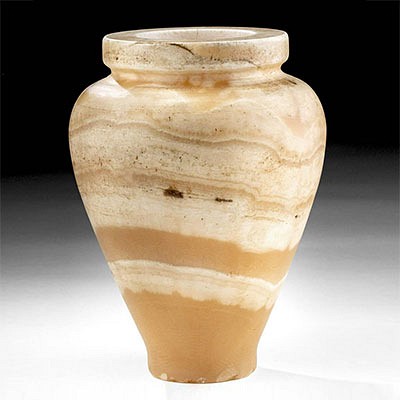Fine Moche Bi-Chrome Stirrup Vessel w/ Four Faces & TL
Lot 104a
About Seller
Artemis Gallery
686 S Taylor Ave, Ste 106
Louisville, CO 80027
United States
Selling antiquities, ancient and ethnographic art online since 1993, Artemis Gallery specializes in Classical Antiquities (Egyptian, Greek, Roman, Near Eastern), Asian, Pre-Columbian, African / Tribal / Oceanographic art. Our extensive inventory includes pottery, stone, metal, wood, glass and textil...Read more
Estimate:
$3,600 - $5,400
Absentee vs Live bid
Two ways to bid:
- Leave a max absentee bid and the platform will bid on your behalf up to your maximum bid during the live auction.
- Bid live during the auction and your bids will be submitted real-time to the auctioneer.
Bid Increments
| Price | Bid Increment |
|---|---|
| $0 | $25 |
| $300 | $50 |
| $1,000 | $100 |
| $2,000 | $250 |
| $5,000 | $500 |
| $10,000 | $1,000 |
| $20,000 | $2,500 |
| $50,000 | $5,000 |
| $100,000 | $10,000 |
| $200,000 | $20,000 |
About Auction
By Artemis Gallery
Dec 17, 2020
Set Reminder
2020-12-17 10:00:00
2020-12-17 10:00:00
America/New_York
Bidsquare
Bidsquare : VARIETY SALE | Antiquities & Ethnographic Art
https://www.bidsquare.com/auctions/artemis-gallery/variety-sale-antiquities-ethnographic-art-6207
Featuring classical antiquities, ancient and ethnographic art from cultures encompassing the globe. Egyptian, Greek, Roman, Etruscan, Near Eastern, Asian, Pre-Columbian, Native American, African / Tribal, Oceanic, Spanish Colonial, Russian, Fossils, Fine Art, more! Artemis Gallery info@artemisgallery.com
Featuring classical antiquities, ancient and ethnographic art from cultures encompassing the globe. Egyptian, Greek, Roman, Etruscan, Near Eastern, Asian, Pre-Columbian, Native American, African / Tribal, Oceanic, Spanish Colonial, Russian, Fossils, Fine Art, more! Artemis Gallery info@artemisgallery.com
- Lot Description
Pre-Columbian, Central Coast Peru, Moche, Phase III, ca. 300 to 500 CE. A finely built pottery vessel with a planar base, a cylindrical body with a quartet of identical portraiture protruding reliefs, a discoid rim with a narrow lateral rim, a stirrup-shaped handle, and a central spout with a slightly flared lip. Depicted on the cream-slipped body are four matching human faces with sculpted features accentuated with applied crimson-hued pigment for the coffee-bean-shaped eyes, the lip lining, and the swirling facial tattoos that stretch up the nose and across the cheeks. The radiating red lines atop the shoulder suggest it represents a hat which all four faces share. Perhaps the depicted faces represent an individual of importance like a prominent warrior, a powerful shaman, or a member of nobility. Size: 5.7" W x 8.75" H (14.5 cm x 22.2 cm)
The stirrup vessel form is named for its resemblance to a horseback riding saddle stirrup. In addition to being iconographically rich, these vessels were also practical. Their narrow openings prevented rapid evaporation of the precious liquid within - a great advantage given the extremely dry deserts of Peru. Note also that the shape of the neck made it easy to carry. Two stirrup vessels could be tied to the ends of a cord and suspended over a llama's back or a person's shoulder.
This piece has been tested using thermoluminescence (TL) analysis and has been found to be ancient and of the period stated. A full report will accompany purchase.
Provenance: private New York, New York, USA collection; ex-private lifetime collection of Dr. Saul Tuttman and Dr. Gregory Siskind, New York, New York, USA, acquired in the 1980s
All items legal to buy/sell under U.S. Statute covering cultural patrimony Code 2600, CHAPTER 14, and are guaranteed to be as described or your money back.
A Certificate of Authenticity will accompany all winning bids.
We ship worldwide and handle all shipping in-house for your convenience.
#153121TL holes on bottom and rim. Handle and spout reattached to top of body, with resurfacing and overpainting along break lines. Minor encrustations and abrasions to base, body, handle, and spout, and light fading to original pigmentation. Great manganese blooms and traces of original pigment throughout.Condition
- Shipping Info
-
All shipping is handled in-house for your convenience. Your invoice from Artemis Gallery will include shipping calculation instructions. If in doubt, please inquire BEFORE bidding for estimated shipping costs for individual items.
-
- Buyer's Premium



 EUR
EUR CAD
CAD AUD
AUD GBP
GBP MXN
MXN HKD
HKD CNY
CNY MYR
MYR SEK
SEK SGD
SGD CHF
CHF THB
THB
















